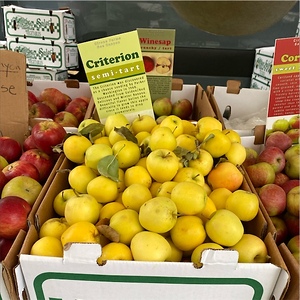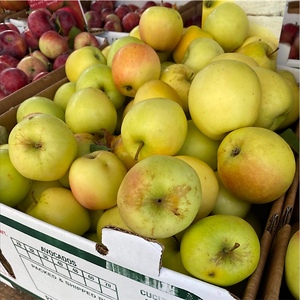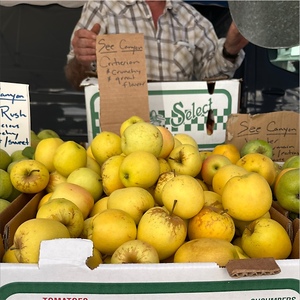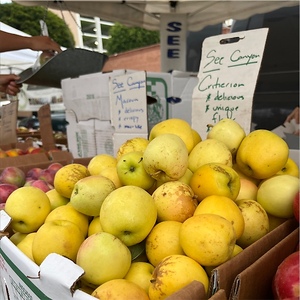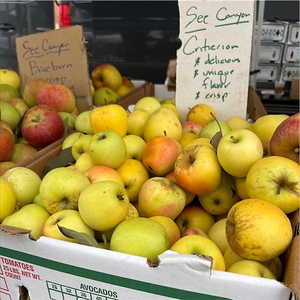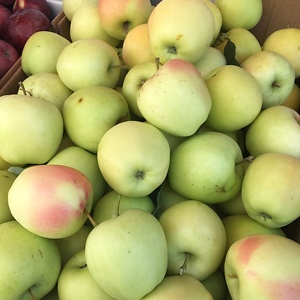


Criterion Apples
Estimated Inventory, lb : 0
Description/Taste
Criterion apples are a medium to large varietal, averaging 6 to 8 centimeters in diameter, and have an elongated, upright, conical to round shape with flat shoulders, a broad middle, and a tapered, narrow base. The apple’s stems are skinny, dark brown, woody, and long, and the skin is semi-thin, smooth, matte, and taut, with faint patches of light brown russet in the stem cavity. The skin also ripens from green to pale golden yellow and is occasionally blushed or striped with faint shades of red or pink. Criterion apples sometimes develop a greasy feel on their surface in extended storage. Underneath the surface, the white to ivory flesh is dense, coarse, and aqueous with a crisp and crunchy consistency. Criterion apples can be consumed raw or cooked and have a sprightly, sweet, tart, and tangy taste.
Seasons/Availability
Criterion apples are available in the fall through early winter.
Current Facts
Criterion apples, botanically classified as Malus domestica, are an American variety belonging to the Rosaceae family. The mid to late-season cultivar grows on deciduous trees reaching 2 to 4.8 meters in height and was discovered as a chance seedling in Washington State in the late 20th century. Criterion apples are an all-purpose variety cultivated for fresh and cooked culinary preparations. The variety is also utilized for cider blends as a sweet and tangy addition. In the modern day, Criterion apples are grown on a small scale in the United States and are a vigorous variety with a biennial nature. The apples are versatile and complement a wide array of sweet or savory dishes.
Nutritional Value
Criterion apples are a source of iron to develop the protein hemoglobin for oxygen transport through the bloodstream, potassium to balance fluid levels within the body, fiber to regulate the digestive tract, and vitamin C to strengthen the immune system while reducing inflammation. The apples also provide small amounts of copper to develop connective tissues, vitamin A to maintain healthy organs, magnesium to control optimal nerve functioning, antioxidants to reduce inflammation and protect the cells against free radical damage, and other nutrients, including calcium, vitamins K and E, and zinc.
Applications
Criterion apples have a sweet and tangy taste suited for fresh and cooked preparations. The variety is categorized as an all-purpose apple and is popularly consumed straight out of hand as a snack or healthy dessert. Criterion apples are slow to brown or oxidize when sliced, making them a favored variety to cut for cheese boards, fruit salads, and slaws. The apples can also be used as a fresh topping over parfaits, oatmeal, and chia pudding or sliced and layered in sandwiches. In addition to fresh preparations, Criterion apples can be simmered into jams, jellies, and other preserves or cooked into sauces, served as a standalone dish, or with roasted meats such as pork chops. The apples can also be baked into pies, crumbles, dumplings, turnovers, and tarts. Beyond culinary preparations, Criterion apples are used in the Pacific Northwest to make cider blends, as the variety contributes a sweet and tangy juice. The variety is also dried and eaten as a chewy snack or chopped into granola, bars, and cereal. Criterion apples pair well with vanilla, maple syrup, brown sugar, spices such as cinnamon, cloves, nutmeg, and ginger, herbs including rosemary, parsley, thyme, and mint, and nuts such as almonds, cashews, and walnuts. Whole, unwashed Criterion apples will keep for 2 to 3 months when stored in a cool, dry, and dark place such as a cellar or refrigerator.
Ethnic/Cultural Info
The name Criterion was given to the apples as a play on the variety’s favored qualities. The definition of the word Criterion means “something that is used as an example for others” or “a standard that is used to judge in comparisons.” The apples were given this moniker as the chance seedling’s flavor, texture, and appearance are considered exemplary for a variety created by chance in nature. Criterion apples are regarded as a specialty cultivar grown on a small scale. The variety is not commercially widespread but is a seasonal delicacy grown throughout Washington State. Apple production in Washington State is a relatively new industry compared to the rest of the apple-growing regions in the United States. Apples were first planted in the state in the 1820s by early settlers, and the eastern portion of the state was selected as the ideal climate, spurring growers to plant vast orchards. Since their introduction, Washington State has become the top apple-producing state, growing apples across 175,000 acres.
Geography/History
Criterion apples are native to Washington State and were discovered growing as a chance seedling in the 1960s. The variety’s parentage is unknown, but it is thought the seedling may have been created from a natural cross between Red Delicious and Golden Delicious apples or Winter Banana and Red Delicious apples. Criterion apples were found in the orchard of grower Francis Cites in 1968 in Parker Heights, a community near Wapato in Washington State. Cites selected the seedling for propagation, and over time, the variety was released to growers nationwide in 1973. Criterion apples were initially favored for their attractive shape and coloring. Today, Criterion apples are not a widespread commercial cultivar, but the variety is grown throughout the Pacific Northwest and other regions of the United States. Criterion apples are also planted in a few preservation orchards in England and used for research and diversity protection.
Recipe Ideas
Recipes that include Criterion Apples. One
| Kosher |
|
A Simple Apple Cake |



